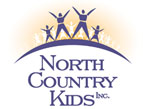Our Mission
At North Country Kids, therapists and parents work together to build bridges that allow each child to achieve success. Although some of these bridges may seem to be built over streams while others cover the widest bodies of water, each is fundamental in ensuring that individual children reach the next destination on their journey toward success.
North Country Kids believes that the partnership between therapists and parents, including the collaboration of caregivers and specialists, is the most important foundation for the support of such bridges. Through early intervention in a child’s natural environment, we are committed to developing an individualized program for your child that provides him or her with the skills needed to reach established goals.
Anyone can make a referral to have a child evaluated. Referrals are made through the local Health Department. If you have concerns regarding your child’s development a referral for a core evaluation can be made. If your child is eligible for services, a Clinton or Essex County service coordinator, and other team members, such as the evaluators, will work with you to develop a plan to help your child and our family.
To reach the Clinton County Health Department Early Intervention Program call (518) 565-4798.
In Essex County call (518) 873-3522.
An Initial Service Coordinator will be assigned and provide your child with a screening or multidisciplinary evaluation. A minimum of 2 evaluators from different disciplines will evaluate your child to determine whether she is eligible for the Early Intervention Program.
The evaluators will assess your child in the 5 major developmental domains and will include information on your child’s health history and family history of health or developmental delays or disabilities. The 5 domains include:
Cognitive– How infants and toddlers interact with the world around them using all their senses. They learn to think and understand behavior and how it affects their environment According to developmental theorist Jean Piaget, it is through sensory and motor experiences that infants develop their cognitive abilities. Critical cognitive skills include intentionality, means-ed behavior, trial-and-error exploration, object permanence and deferred imitation.
Communication– Language development follows a predictable pattern. You’ll find that a baby’s language develops from coos and grunts in the first 12 months, to first words around 10-12 months, to two word sentences around 18-24 month and, finally, to whole sentences around age 3. In the first 12 months, babies also communicate with you by crying, smiling, or using body gestures (like pointing to something). Communication and language development means learning how to use nonverbal as well as verbal (spoken) actions to express want, needs or ideas.
Social-Emotional-
Adaptive–
Motor-
Children up to 3 years of age and their family may be eligible if the child:
- was born early
- has a vision or hearing problem
- has a disability or health condition
- has been slow to sit up, crawl, or walk
- has been slow to make sounds, use words or talk
- has behavior or attention difficulties
- family is experiencing social or environmental stresses that are likely to affect development
If your child is found eligible the program is funded by the state and county with no cost to you. Your health insurance may be accessed for reimbursement of services provided. The Early Intervention Program only covers the cost of services. It does not pay for daycare or other fees charged by community settings.
If your child is found eligible for early intervention services a written plan called an Individualized Family Service Plan (IFSP) will be developed. The Initial Service Coordinator, Evaluators, Family any others designated by the family will participate in developing the IFSP.
This plan consists of outcomes developed by the team based on the families resources, concerns and priorities. It will include the frequency, intensity, and duration of each service found appropriate to meet the outcomes.

 North Country Kids, Inc.
North Country Kids, Inc.
 Fax 518-561-3805
Fax 518-561-3805